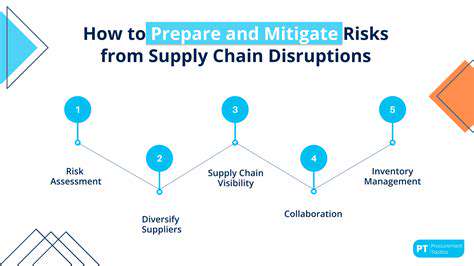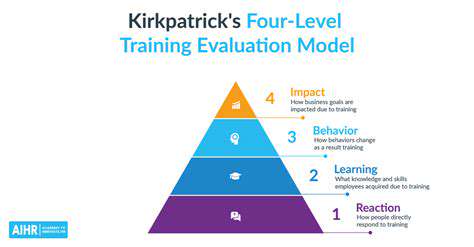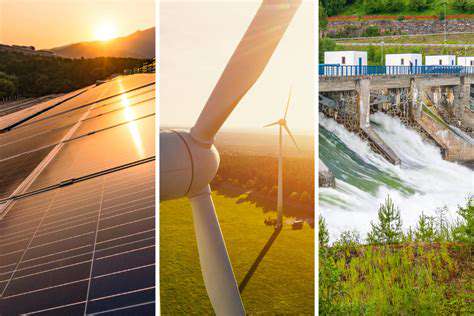Biofuels for Transportation: Ethanol, Biodiesel, and Advanced Biofuels
Biodiesel Production and Properties
Biodiesel, a renewable and sustainable alternative to petroleum-derived diesel fuel, is produced through the transesterification of vegetable oils or animal fats. This process involves reacting the oil or fat with an alcohol, typically methanol, in the presence of a catalyst. The resulting biodiesel is a mixture of fatty acid methyl esters (FAMEs), which share similar properties to petroleum diesel. This chemical transformation allows for the seamless integration of biodiesel into existing diesel engine infrastructure, a crucial factor in its potential for widespread adoption. The production process, while relatively straightforward, can vary depending on the feedstock used and the desired level of purity.
Biodiesel's properties contribute to its suitability as a transportation fuel. It boasts a high cetane number, impacting its ignition quality and combustion efficiency within diesel engines. Furthermore, biodiesel exhibits a relatively low sulfur content, which is beneficial for reducing emissions and promoting cleaner air quality. Its viscosity, while often similar to conventional diesel, can sometimes require adjustments to ensure optimal performance in cold weather conditions. These properties, combined with its biodegradability and reduced dependence on fossil fuels, make biodiesel a compelling alternative fuel option for the future.
Environmental and Economic Considerations
The environmental impact of biodiesel production and use is a crucial aspect to consider. While biodiesel is touted as a cleaner fuel, the environmental footprint depends heavily on the feedstock source and the production process. Sustainable feedstocks, such as waste cooking oil or algae, can significantly reduce the environmental burden compared to using arable land for crops specifically grown for biodiesel production. Careful consideration must be given to the land use implications and potential competition with food production.
From an economic standpoint, biodiesel production presents both challenges and opportunities. The cost of feedstocks, along with the cost of production, can fluctuate depending on market conditions and the availability of raw materials. However, the potential for creating local jobs in the production and distribution of biodiesel, coupled with the potential for reduced reliance on imported petroleum products, presents significant economic advantages. Government policies and incentives can play a crucial role in fostering the development and adoption of biodiesel technology and infrastructure.
Furthermore, the potential for reducing greenhouse gas emissions, particularly in transportation, is a major economic driver for the increased use of biodiesel. This environmental benefit, coupled with potential cost savings in the long term, makes biodiesel a promising investment for both businesses and individuals.
The interplay between economic viability and environmental sustainability is a key factor in determining the long-term success of biodiesel as a transportation fuel. Government regulations and consumer preferences will likely play a significant role in shaping the future of this important alternative energy source.

The Role of Government Policies and Incentives
Government Support for Biofuel Production
Government policies play a crucial role in shaping the biofuels industry, particularly in the realm of ethanol production. Subsidies and tax incentives can significantly lower the cost of production, making biofuels more competitive with traditional fossil fuels. These financial supports often target specific aspects of the process, such as feedstock cultivation, processing technology, or the development of infrastructure for biofuel distribution. Incentives can spur investment in research and development, leading to improvements in efficiency and sustainability. However, the design and implementation of these policies must be carefully considered to avoid unintended consequences, such as environmental damage or displacement of food crops.
Regulations and Standards for Biofuel Quality
Establishing clear standards and regulations for biofuel quality is essential for ensuring consumer safety and the reliable operation of vehicles designed to use these fuels. These regulations often cover aspects such as the ethanol content in gasoline blends, the level of contaminants, and the overall energy content of the fuel. Strict quality control measures are crucial for maintaining engine performance and preventing potential damage to vehicles. Additionally, regulations often address the sustainability of the feedstock used to produce the biofuel, encouraging the use of renewable resources and minimizing environmental impacts.
Incentives for Biofuel Infrastructure Development
The development of a robust infrastructure for biofuel production and distribution is vital for the widespread adoption of biofuels. Government incentives, such as tax credits or grants, can encourage the construction of ethanol plants, the expansion of pipelines, and the creation of retail stations capable of handling biofuel blends. These investments are critical to overcome logistical barriers and ensure a reliable supply chain for biofuels. Government support for infrastructure projects can also stimulate economic growth in rural areas, creating jobs and fostering local development.
Government Policies Affecting Feedstock Availability
The availability of feedstocks, such as corn or sugarcane, is a critical factor influencing the cost and sustainability of biofuel production. Government policies related to land use, agricultural practices, and trade can significantly impact the supply of feedstocks. Policies that promote sustainable agriculture and efficient resource management can ensure a reliable and environmentally responsible feedstock supply. Conversely, policies that encourage monoculture farming or prioritize food production over biofuel feedstocks can hinder the growth of the biofuel industry.
Promoting Research and Development in Biofuel Technologies
Government funding for research and development (R&D) in biofuel technologies is essential for driving innovation and improving the efficiency and sustainability of biofuel production. R&D efforts can focus on developing new feedstocks, improving conversion technologies, and minimizing the environmental footprint of biofuel production. Funding for research projects can lead to breakthroughs in biofuel technology, potentially lowering production costs and expanding the range of feedstocks suitable for biofuel production. This support can contribute to the long-term viability and competitiveness of biofuels.
Addressing the Environmental Impact of Biofuel Production
The environmental impact of biofuel production is a complex issue, and government policies must address potential negative consequences. Policies can encourage the use of sustainable agricultural practices, reduce emissions from biofuel production facilities, and promote the development of carbon-neutral biofuels. Government regulation and incentives can foster the adoption of environmentally sound practices throughout the entire biofuel lifecycle, from feedstock cultivation to end-use consumption. Careful consideration of environmental factors is essential to ensure that biofuels are truly sustainable and contribute to environmental protection.










